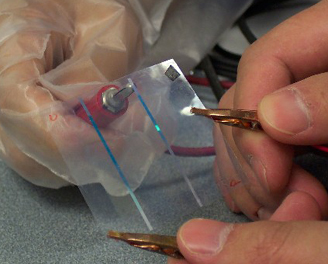
NIT >> News
|
December 11, 2003 Major breakthrough in flexible displays by NIT supported researchers  Imagine that you are reading an electronic newspaper or communicating with your family by unrolling a large-screen display or video cell phone. When you are finished, you roll it back up to the size of a pen and safely place it in your pocket.
Imagine that you are reading an electronic newspaper or communicating with your family by unrolling a large-screen display or video cell phone. When you are finished, you roll it back up to the size of a pen and safely place it in your pocket.By producing the first flexible organic light emitting devices (FOLEDs) in Canada, University of Toronto researchers, working with support from the Nortel Institute for Telecommunications, have brought us one step closer to that vision. The major research breakthrough was led by Prof. Zheng-Hong Lu (Materials Science and Engineering) and his research team including Brian Fung and Dr. Sijin Han. Brian Fung is a fourth year undergraduate student major in Engineering Science, and Dr. Han is a Post Doctoral Fellow. FOLEDs are organic light emitting devices (OLED) fabricated on flexible substrates. Traditionally flat panel displays, such as LCDs, have been fabricated on glass substrates. New, flexible materials, however, have significant performance advantages over traditional glass substrates. The use of thin plastic substrates also significantly reduces the weight of flat panel displays, such as those in cell phones, portable computers, and large-area televisions. They are also more robust in terms of transportation and installation of displays compared to their glass-based counterpart. The FOLED technology potentially offers the ability to use roll-to-roll processing, much the same as newspapers are currently printed. This has tremendous implication for the realization of very low-cost and yet high-efficiency mass production cost to produce these types of displays. The Nortel Institute for Telecommunications (NIT) is a cross-faculty unit of the University of Toronto. NIT has provided research support for FOLED research through its Organic and Polymer Optoelectronic research thrust. This thrust seeks to harness the possibility of designing new molecules and materials towards specific functions in communications networks. More info: Prof. Lu's research team |
